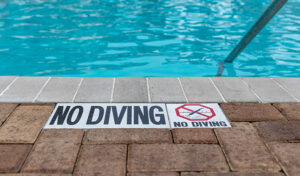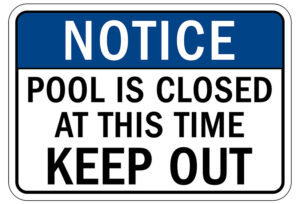Many homeowners associations manage swimming pools that are available for member use. One of the pillars of pool management, though, is promoting the safety of pool goers. To accomplish that, a board must enforce certain HOA pool safety rules.
Essential HOA Pool Safety Rules to Have
Having a pool within the community can be great for driving homeowner satisfaction and appeal. They can attract potential homebuyers and are the perfect place to cool down in the summer. But pools also come with certain responsibilities — one of them is safety.
In the United States alone, an estimated 4,000 fatal unintentional drownings happen yearly. And then there’s another 8,000 nonfatal drownings on top of that. Apart from the risk of drowning, pool-goers can also hurt themselves through other means. As such, promoting safety by enacting HOA pool rules is essential.
But what rules should an HOA even have? While HOA pool safety rules can differ from one community to another, here are seven rules to help you get started.
1. No Diving
 First, pool-goers should not dive in the pool. This is one of the most common pool rules among HOA communities. So why aren’t pool-goers allowed to dive in the water?
First, pool-goers should not dive in the pool. This is one of the most common pool rules among HOA communities. So why aren’t pool-goers allowed to dive in the water?
Not all pools are deep enough to accommodate diving. If the water is too shallow, diving could severely injure drivers. It can even be fatal. Even if a pool is deep enough, there is still a chance that a diver might hurt themselves if they fail to dive correctly. And the HOA may be held responsible for such a tragic occurrence.
2. No Running or Pushing
Running and pushing are huge contributors to pool injuries. Even if pool-goers are just horsing around, running and pushing can lead to harm, unintentional or otherwise. A light push can throw someone off their balance because of slippery surfaces, causing them to fall and hurt themselves (or worse). The same can happen when a pool-goer runs. Thus, it is important to have a rule that prohibits running and pushing in your HOA’s pool area.
3. No Swimming Under the Influence
An HOA does not have much control over what members do inside their homes. Once members step into the pool or other common areas, the HOA can restrict their actions. That includes prohibiting pool-goers from drinking alcoholic drinks while swimming or swimming while already under the influence of alcohol or narcotics.
When under the influence, people don’t tend to have complete control over their mental and physical faculties. Alcohol and drugs can impair a person’s ability to swim or exercise proper judgment, thereby increasing the risk of drowning.
 4. No Swimming Alone
4. No Swimming Alone
No one should swim without a buddy, not because it’s lonely but because it’s dangerous. If something happens to a lone swimmer, no one will be around to help them. And things can quickly go from bad to worse. Therefore, as part of your HOA pool safety rules, you should forbid members from using the pool alone.
5. No Glass Containers in the Pool Area
It’s understandable for pool-goers to want to bring a drink to the pool area. After all, what better way to cool down in the summer?
While you can allow drinks in the pool area, it’s best to prohibit glass bottles or any other kind of glassware. Glass can shatter and cause injuries to pool-goers. It’s even worse because glass is transparent, so you can’t spot the shards that end up in the water.
6. No Electrical Devices in the Pool Area
Everyone knows that water and electricity just don’t mix. As such, where there’s a large body of water, it’s best to keep away any electrical devices. Forbid members and their guests from bringing electrical devices of any kind to the pool area to avoid electrocution.
7. No Swimming During Inclement Weather
 If you have an outdoor pool, one of the things you should constantly monitor is the weather. While most HOAs open their pool doors during the spring and summer seasons, thunderstorms and other bad weather conditions can still occur.
If you have an outdoor pool, one of the things you should constantly monitor is the weather. While most HOAs open their pool doors during the spring and summer seasons, thunderstorms and other bad weather conditions can still occur.
It’s a good idea to prohibit residents from using the pool during inclement weather. But, some residents may intentionally break this rule and sneak into the pool. As such, if there’s a storm or a hurricane on the forecast, it’s better to close the pool area altogether until the weather cooperates. An HOA restricting pool access is a common and wise decision in this case.
Other HOA Pool Safety Tips
Aside from enforcing pool rules, an HOA board will also benefit from applying some additional pool safety tips. Here are the HOA swimming pool safety tips to keep in mind.
- Consider hiring a pool monitor or lifeguard. A pool monitor or lifeguard on duty can minimize safety risks and keep an eye on pool-goers. They can even catch people who break the rules. But, this may be a double-edged sword. By hiring a pool monitor or lifeguard, an HOA implies that it is responsible for protecting pool-goers’ lives, thereby increasing the risk of liability. If you decide to hire a lifeguard, hire a trained and licensed one or seek help from a pool management company.
- Post signs. While homeowners should know the rules and regulations of the HOA, it’s hard to have all of them memorized. Ensure to inform pool-goers by posting signs of the pool rules in the pool area.
- Keep emergency equipment nearby. An HOA should always have rescue equipment and emergency kits in the pool area. It’s also good to have an emergency pool phone with emergency numbers laminated and posted. In some states, these precautions are even mandatory.
- Clean the pool regularly. A dirty pool is not only unhygienic but is also a liability waiting to happen. To avoid accidents and health issues, make sure to have your pool company clean the pool and pool deck regularly.
Establish an HOA Pool Guest Policy
It is normal for an HOA to have a pool guest policy. Many associations allow residents to invite guests to use the pool. But, the HOA has to draw the line to avoid the possibility of abuse and nuisances. If you have yet to craft your own pool guest policy, here are some rules to give you an idea.
- Visitors and house guests may only use the pool up to three (3) times per season. Beyond that, they must pay a fee of $10 per person per use.
- Visitors and house guests must follow all of the association’s rules, including pool rules.
- A member household may host a maximum of five (5) pool guests daily.
- Guests may not enter the pool area before their accompanying HOA member arrives. Additionally, guests must leave when their accompanying member leaves.
- All guests must sign in at the entrance of the pool area.
- Members are responsible for their guests at all times.
Be Careful About HOA Pool Age Restrictions
Regarding pool safety, many HOAs enact a rule prohibiting children below a certain age from swimming without adult supervision. At first glance, this seems like a completely normal rule to have. After all, children do have the highest drowning rates. But there is more to this rule than meets the eye.
A pool age restriction may be in violation of the Fair Housing Act, which prohibits discrimination based on familial status, among other things. In fact, there have been previous cases where a court ruled in favor of the homeowners against HOAs that have such restrictions (Iniestra v. Cliff Warren Investments, Inc. and Llanos v Estate of Coehlo). The courts have not provided guidance on how an HOA can promote the safety of children in pools, so an HOA would be better off speaking to its lawyer.
Playing an Important Role
Every board should have HOA pool safety rules in place. These rules create a safe environment for residents and limit the association’s exposure to potential liability, but it’s not enough to simply enact the rules. An HOA must do its part to effectively communicate these rules with members.
Elite Management Services provides expert management services to HOAs and condominiums. Call us today at (855) 238-8488 or contact us online to learn more!
RELATED ARTICLES:
- 9 Fun Spring Activities For Your HOA Community
- Taking Care Of Community Common Area Maintenance
- HOA Vaping Rules: Steps You Can Take to Prevent Vaping in Your Community






